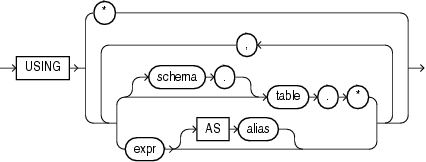| Oracle® Database SQL Language Reference 11g Release 2 (11.2) Part Number E17118-04 |
|
|
PDF · Mobi · ePub |
| Oracle® Database SQL Language Reference 11g Release 2 (11.2) Part Number E17118-04 |
|
|
PDF · Mobi · ePub |

This function is for use with clustering models that have been created using the DBMS_DATA_MINING package or with the Oracle Data Mining Java API. It returns the cluster identifier of the predicted cluster with the highest probability for the set of predictors specified in the mining_attribute_clause. The value returned is an Oracle NUMBER.
The mining_attribute_clause behaves as described for the PREDICTION function. Refer to mining_attribute_clause.
See Also:
Oracle Data Mining Concepts for detailed information about Oracle Data Mining
Oracle Data Mining Administrator's Guide for information on the demo programs available in the code
Oracle Data Mining Application Developer's Guide for detailed information about real-time scoring with the Data Mining SQL functions
The following example lists the clusters into which customers of a given dataset have been grouped.
This example, and the prerequisite data mining operations, including the creation of the km_sh_clus_sample model and the mining_data_apply_v view, can be found in the demo file $ORACLE_HOME/rdbms/demo/dmkmdemo.sql. General information on data mining demo files is available in Oracle Data Mining Administrator's Guide. The example is presented here to illustrate the syntactic use of the function.
SELECT CLUSTER_ID(km_sh_clus_sample USING *) AS clus, COUNT(*) AS cnt
FROM mining_data_apply_v
GROUP BY CLUSTER_ID(km_sh_clus_sample USING *)
ORDER BY cnt DESC;
CLUS CNT
---------- ----------
2 580
10 216
6 186
8 115
19 110
12 101
18 81
16 39
17 38
14 34
10 rows selected.